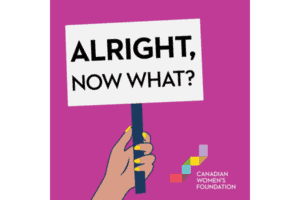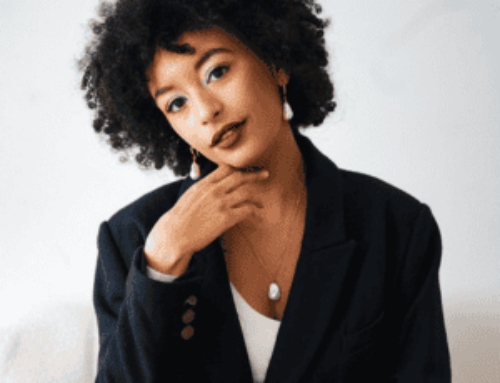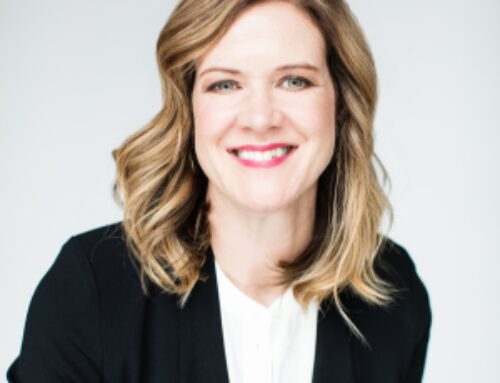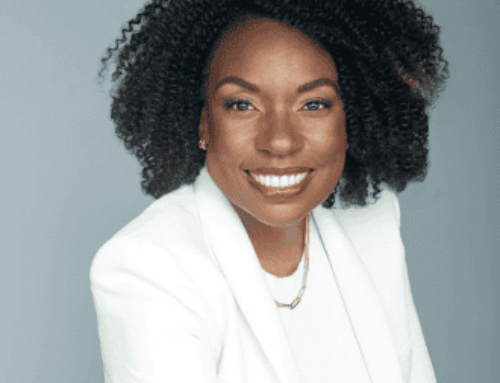 The Canadian Women’s Foundation’s new national survey shows a significant difference between how able people feel to support those facing abuse and how supported those survivors of abuse actually feel. It shows that most people believe everyone has a responsibility to end gender-based violence but, at the same time, almost half think the issue’s too big to play a role in ending it and almost one quarter feel intimate partner abuse is none of their business if it doesn’t directly involve them. What in this world is this “support gap” all about? How do we bring our values and actions in line so that survivors of abuse get the non-judgmental support they deserve?
The Canadian Women’s Foundation’s new national survey shows a significant difference between how able people feel to support those facing abuse and how supported those survivors of abuse actually feel. It shows that most people believe everyone has a responsibility to end gender-based violence but, at the same time, almost half think the issue’s too big to play a role in ending it and almost one quarter feel intimate partner abuse is none of their business if it doesn’t directly involve them. What in this world is this “support gap” all about? How do we bring our values and actions in line so that survivors of abuse get the non-judgmental support they deserve?
Stacey Rodas, Manager of Public Relations and Online Engagement at the Canadian Women’s Foundation, led the way in this research and joins us now to talk about it.
Content note: this episode features discussion of gender-based violence. If you need access to support, you can find a list of services that may be useful to you on our website.
Transcript
00:00:00 Andrea
Hi, I’m Andrea at the Canadian Women’s Foundation.
Released this week, our national survey shows the difference between how able people feel to support those facing abuse and how supported those survivors of abuse actually feel.
It also shows that most people believe everyone has a responsibility to end gender-based violence, but at the same time, almost half think the issue is too big to play a role in ending it and almost one quarter feel intimate partner abuse is none of their business if it doesn’t directly involve them.
What in the world is this about?
Welcome to Alright, Now What?, a podcast of the Canadian Women’s Foundation. We put an intersectional feminist lens on stories that make you wonder “Why is this still happening?” We explore systemic roots and strategies for change that will move us closer to the goal of gender justice.
The work of the Canadian Women’s Foundation and our partners takes place on traditional First Nations, Métis, and Inuit territories. We are grateful for the opportunity to meet and work on this land. However, we recognize that land acknowledgements are not enough. We need to pursue truth, reconciliation, decolonization, and allyship in an ongoing effort to make right with all our relations.
00:01:14 Andrea
Rates of gender-based violence like intimate partner abuse, sexual violence, and emotional abuse were high in Canada before the pandemic. In the pandemic, the risk and incidence of this abuse has only increased.
Our national survey suggests that while we hold strong values about playing a role to end violence, when it comes to actually doing it and supporting survivors, there are significant gaps to tackle.
Stacey Rodas, manager of PR and online engagement at the Canadian Women’s Foundation, led the way in this research and she joins us now to talk about it.
What are the support gaps when it comes to gender-based violence exactly? And what does this mean, from the data that you found?
00:01:53 Stacey
It’s the difference between how well the general public believes they can support someone facing abuse and how supported those facing abuse actually feel. What our survey found was for physical abuse, there’s a 20% support gap. So that really means 86% of people in Canada felt able to support someone in that situation, but only 66% of those who disclosed felt supported, kind of concerning.
We asked the same question for sexual abuse and emotional abuse and we found similar gaps. You know we found a 17% gap for sexual abuse, where 80% of people felt they could support someone in that situation, but only 63% who actually disclosed felt supported. And for emotional abuse, there was a 15% gap, so that was about 85% of people felt able to support someone there, but only 70% of those who disclose felt supported.
We know that people who want to disclose their experience of violence are more likely to do so to someone that they know rather than to authorities. I’m concerned because if we don’t know how to support someone experiencing violence very well, but we think we do, and we’re hearing from survivors that no, they’re not feeling very well supported by the people they disclosed to, then all of us in the general public need a bit of an education there. I mean, that’s where my head is at, is we all could do a little more work on just being prepared in case somebody does disclose violence to us, what would we do?
How would we know what to say?
Would we know what resources to share with them?
That’s what I mean by having an education on this. It’s about unlearning some of those inaccurate and unhelpful stigmas that we may carry with us. It’s about being more supportive, being less judgmental. We can also educate ourselves on local resources in our area- that could be for anything from counseling to emergency shelter services just so that we know what’s local to us.
We just need to let the person disclosing guide us. You know, they may just want to talk about what’s happening. They may want some help. They may want you to involve authorities, but they may not. So it’s really about asking them what they need and then we need to really listen and follow through. And that entire educational journey, it’s actually something that our Foundation has worked really hard to prepare. We wanted to make it really easy, really accessible, and that’s why we put together Signalresponder.ca
00:04:19 Andrea
For me, what I find so interesting, is this idea that so many people believe in anti-violence and nonviolence? We see this big difference between the values of anti-violence and our abilities actually to act on them when we’re faced with a real situation.
00:04:35 Stacey
The survey found legitimate reasons why people were afraid to get involved and so we need to kind of take those to heart and we need to see how we can address those so that more people feel comfortable assisting someone experiencing abuse.
For example, we found that 54% were afraid to help someone experiencing gender-based violence in public in case they put themselves or others at risk of harm. And then in private, we found 51% are afraid to help out there because they think they’re just going to make the situation worse by helping.
If we have this data telling us this is why people don’t intervene, well like, let’s address that, let’s maybe go into some deeper learning, some deeper conversations about that and find out how we can sort of provide resources to counter those issues so that people don’t feel caught off guard, or they know enough about what to do that these numbers go down, that people aren’t so afraid anymore because they understand public bystander intervention, they understand how to privately assist in a discreet way and that’s sort of part of why the Signal for Help was even created in the first place. Because it’s so discreet and it doesn’t leave a digital trace.
00:05:42 Andrea
This idea that everybody has a responsibility to stop gender-based violence: we saw 90% of people agreed with that, and they agreed that everybody needs to be empowered to help somebody they know who’s experiencing gender-based violence. But at the same time too, we also found that 23% felt that intimate partner violence is none of their business if it doesn’t directly involve them. And 24% feel that it’s a personal issue and not a societal problem, and then fully 46% feel that the issue of gender-based violence is too big to play a role in ending it.
So tell me a little bit more about how education can kind of bring our values closer together with our concerns and our hesitancy and our just feeling like it’s not our business and it’s not our problem.
00:06:29 Stacey
I’d love to see more alignment between the values that we hold.
Almost every person in Canada says gender-based violence needs to be openly and publicly addressed.
We need to end it.
That misalignment between that kind of statistic and then like, but it’s too big of a problem for me to tackle. That’s one of the concerns you mentioned. These other reasons why we’re kind of seeing people talk about their values, and that they believe in gender-based violence needing to end. But then having these other issues of, like I mentioned, not knowing how to support someone but then also not really seeing themselves in ending gender-based violence, not really seeing their agency and their personal ability to help do that. I mean, we saw that through the statistics of the issue feeling too big to play a role in, thinking that it’s just a personal issue, not a societal problem, thinking it’s none of my business, especially if it’s intimate partner violence it doesn’t involve me -that gap there between the values and the action.
I mean, we’d be in a really bad place if the values and the action were both really low, but we’re in a good place because the values are there. We believe we want to end gender-based violence. We believe that this is something that needs to be done. But the agency isn’t there. That’s not to blame anyone. That’s to simply say we see where the education is needed and Canadian Women’s Foundation is going there.
People just still don’t know enough or they have too many fears around what action will cause. But on the flip side of that, you know inaction causes consequences too, so we have to kind of take it from a perspective of, let’s actively be educating ourselves so that we are not so caught off guard if someone discloses to us, because I think a lot of people don’t, they’re not unsupportive because they want to be unsupportive. I think they sometimes don’t know what to do because they’re caught off guard. You know, I know in a personal situation, someone disclosed to me and I had no idea, you know all the stigmas were kind of going through my head like oh, but they look so good together like I would never have guessed that anything was wrong. This couple, like I can’t believe this is being disclosed to me, I thought they were perfect and I think we need to move from wow, I didn’t know into Oh my goodness, I’m sorry, I believe you, what can I do? Tell me what I can do to help you in your situation. I’m here to listen. I can provide resources, anything you need let me know.
00:08:50 Andrea
We did see that when people disclose their most recent experience of abuse, there were some encouraging numbers that came out about what happened, but the experience was markedly different for people with disabilities.
Tell us a bit about those findings and why this might be a gap.
00:09:04 Stacey
Those who did disclose their most recent experience of abuse, we found overwhelmingly they were believed 82% felt believed, they felt they were treated kindly. That was about 80%, so we were very encouraged by that. But then we looked into the data a little bit more for people with disabilities. we saw it was a bit lower. We saw 76% felt they were believed and only 74% were treated kindly, so that’s concerning. We also found that the number was lower for people with disabilities, when it came to feeling heard and validated, 67% felt, heard and validated. But only 56% of people with disabilities said the same thing.
So women, girls, gender diverse folks with disabilities, they already are at higher risk of gender-based violence. So if they’re already feeling like they’re not going to be believed, they’re not going to be well supported, that might lead them to not wanting to disclose, not wanting to talk about it, and it may affect their healing journey.
Now, not everybody decides to disclose. There’s many reasons why someone might not. It doesn’t mean they can’t heal. Everybody’s healing looks different. But I think knowing that the option is available to you and that you feel like you could if you wanted to, I think that’s important. And if there’s a population that doesn’t really feel like that might be an option, or from the statistics, that’s what we could infer, that’s concerning. We need to make sure that folks with disabilities know that they can come forward if they choose to, and that they will be supported and they will be believed.
I think that also just kind of speaks to intersectionality and having an intersectional feminist lens in everything we do to prioritize the needs of those who are in that position. There’s other intersections that somebody with a disability may experience that others would not. You know, for example, being at higher risk of gender-based violence but also having economic independence is really important for someone who has a disability. Because we know that economic dependence can be intertwined with gender-based violence and staying in an abusive situation. Many people don’t want to leave that situation if they feel like they will fall into poverty. You kind of add that layer on to someone’s experience, someone who has a disability and then you kind of see like this is making for a potentially very bad scenario.
00:11:31 Andrea
The group that’s most likely to be disclosed to when it comes to emotional and sexual abuse in particular are women aged 18 to 54. I find this so interesting. What’s your thought about why this might happen and what it means?
00:11:46 Stacey
The emotional labor there is what concerns me. If you think about it, women do the bulk of emotional labor like this already. They’re concerned with the needs of others. They’re managing expectations and requirements of others in a way that we know that that’s typically fallen to women.
I want to see men taking up this education and this learning journey.
I would love to see folks signing up at signalresponder.ca and learning how to be supportive. There’s this emotional labor piece that really kind of gets me there and makes me really kind of like I said charged up. But then there’s also this other piece where there’s the social conditioning that we have. T’s not true that anybody is biologically better than anybody else at supporting their fellow humans. But this misconception remains that this is women’s work to do. I just want to challenge that, I think that’s part of the way we’ve been raised, I think that that needs to change as well.
I think that survivors need to know that they can go to anyone in their lives and know that they’ll be supported when they disclose their experience. That’s maybe only a sphere of their life. Maybe they’re only disclosing to someone aged 18 to 54 who’s a woman, maybe that’s a family member or a friend, or maybe a coworker. But the more people who seem like somebody who could assist you or help you if you were in that kind of situation, the more people that you have access to. I think that gives you more options as a survivor or to make sure that you’re supported in all spheres of your life. You know you may only feel comfortable telling one person, but that person is also not your coworker, so then nobody at work kind of knows what you’re dealing with and you may not feel very supported in the work sphere of your life, but you may feel well supported in you know the family or friend groups sphere of your life, but I think the more people that we have who can be supportive if it’s going to be better for survivors, then in all the areas of their lives. They’re going to feel like they can talk openly about what happened to them and that they’ll be supported at work, they’ll be supported by family, they’ll be supported by friends. They won’t feel judged, blamed or shamed, and that’s really what we’re trying to get at here.
00:13:54 Andrea
Alright, now what?
Please sign up to become a Signal for Help Responder at signalresponder.ca. Over 10,000 people have already done it to get tools, training and resources to better support survivors of violence responding to any sign or signal of abuse. I often think I’m good at being a non-judgmental supporter to my family and friends. But this research has challenged me to take intentional steps to learn more and do better, even if it’s just a matter of reinforcing what I know, I think it’s worth it.
And you can learn more about the survey results by visiting canadianwomen.org.
00:14:32 Andrea
Please listen, subscribe, rate and review this podcast and share it with others. If you appreciate this content, if you want to get in on the efforts to build a gender equal Canada, please donate today and consider becoming a monthly donor. And thank you for being tireless in your support for gender justice.






